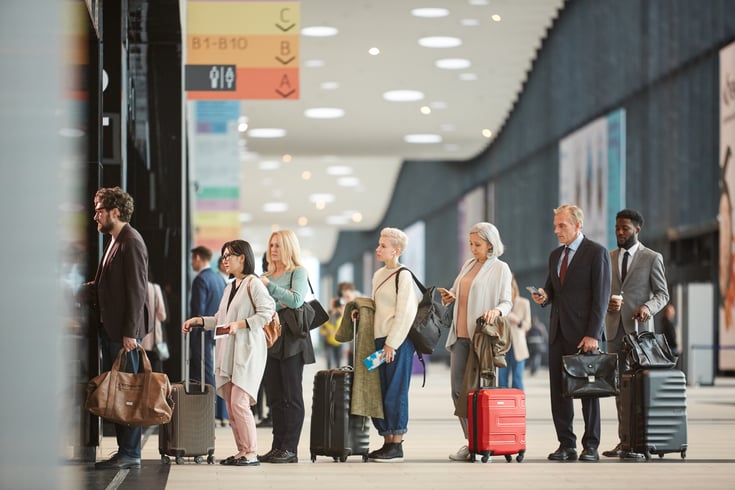Wayfinding at airports is important because it helps passengers navigate the complex and often congested spaces at airports. Moving within airports can be confusing and stressful, especially for travellers who are unfamiliar with the layout or who have limited time to catch their flights.
This is especially true these days with airports becoming larger in size. Heathrow airport for example measures 1,227 hectares with 4 terminals. The largest terminal T5, measures 353,020 square metres which is the same size as 50 football pitches.
Traditional wayfinding/navigation systems, such as signs and maps, help to orient passengers and guide them to their gates, baggage claim areas, security check areas, restrooms, and other facilities. These may not always be very easy to understand for a lay person and can lead to confusion especially when they are rushing to catch their flight.
Some airports also provide paper-based maps that are not always easily available, nor are they easy to understand. Moreover, physical signage cannot be placed at all locations and can easily be missed by travellers and sometime they may not provide navigation to the specific facility to which the passenger wants to go.
As per the available statistics, in 2021 around 10.5 million passengers travelled through Terminal 5 of Heathrow airport. With this big number of travellers in one terminal, wouldn’t it be nice if they had access to real-time navigation that guides them step-by-step from their current location to the exact destination of their choice.
With the latest innovations in the area of wayfinding solutions, we may be able to provide more relevant, practical, easy-to-use tools that can significantly ease the travellers’ experience while exploring multiple facilities around the airport. These solutions can be made available on smart mobile phones or via digital kiosks.
Besides this, wayfinding can also be an effective tool in the hands of airports to engage with their customers in a more effective manner.

Finding way to the boarding gates
The primary goal of the passengers is to find their way to the boarding gate. Heathrow airport, for example, has 115 boarding gates across all 4 terminals and it can be a very stressful experience finding your way to the boarding gate especially when there is a huge crowd and limited time to board the flight. The passenger can use the Wayfinding system to scan his boarding pass, enable the system to uniquely identify the passenger and provide real-time directions to the boarding gate. It can also notify the passenger in case there is any change in the boarding gate.

Reclaiming baggage
The wayfinding solution can navigate the passenger to the exact carousel where his baggage is expected and also notify the wait time. This can particularly take away the anxiety of the passengers who are waiting for a long time and still do not see their baggage arrive.
Airport facilities/Shopping
Some people are not able to locate the restrooms or feeding rooms or the shops that they are looking for. This makes the whole experience stressful. Wayfinding solutions help people find the required destination with the help of arrows, directions or cues.

Passenger flow management at airport
When the passengers are not aware of their route, it may lead to big crowds. Accidents may happen and exit during emergencies can be difficult in these scenarios. Showing direction or maps on digital kiosks or smart devices can save time and increase the overall efficiency of the airport.
Flight Information Display Systems

Wayfinding systems can easily be integrated with the flight information display system to provide information in real time. Travel information like delays in arrival or departure, change of flight timing or special offers can be conveyed through these systems.
Multilingual support
Airports face this challenge of making announcements and putting signboards in multiple languages. They have to be sensitive to the languages and cultures of various nationalities. Wayfinding solutions can be integrated with multilingual support. Passengers can get the required information in the language of their choice.
Advertising and Promotions
Wayfinding solutions can be used to promote products, services, or events to people as they move through the environment. For example, airports can use wayfinding signs to direct people to a new store or special sale, or an airport might use wayfinding displays to advertise a new destination or travel deal. Advertisements can be a great source of revenue for airports.

Feedback
As the number of passengers is increasing and airports are expanding day by day, personalized wayfinding has become essential. Direct feedback can help airport management tailor a more comfortable passenger experience.
Internal communication and improved security
Airport staff can use the solution as a convenient tool for internal communication. Supervisors can track the staff movement. Any threat or alert can be shared using this solution and exit directions can be given in case of emergency.
Behavioural insights
Wayfinding solutions provide a wide range of insights and analytics that can be used to improve airport operations in many ways. It allows airports to gather information about where passengers are going, which routes they take when moving from place to place in the airport, how long it takes them to get through a certain area or terminal, etc. The recorded data can become good reference point for retailers and food joints and other operational aspects.
The adoption of wayfinding systems can be a huge boost for airports. A properly implemented Wayfinding solution will allow airports to become more efficient and passenger centric.
About Coforge
Coforge is a global digital services and solutions provider, that enables its clients to transform at the intersect of domain expertise and emerging technologies to achieve real-world business impact. Coforge Xtreme Navigator, an intelligent Wayfinding solution serves various purposes across the large airports. It can also provide Augmented Reality capability to help people navigate through large physical spaces. This wayfinding solution is compatible with both iOS and Android devices. This innovative solution increases the overall efficiency of the airports.

Deepak Saini is VP-AI. He has 24 years of IT experience with strong technology leadership experience in Generative AI, Agentic AI, Machine Learning, Deep Learning, NLP, Speech, Conversational AI, Contact Center AI, and Responsible AI.
Related reads.
About Coforge.
We are a global digital services and solutions provider, who leverage emerging technologies and deep domain expertise to deliver real-world business impact for our clients. A focus on very select industries, a detailed understanding of the underlying processes of those industries, and partnerships with leading platforms provide us with a distinct perspective. We lead with our product engineering approach and leverage Cloud, Data, Integration, and Automation technologies to transform client businesses into intelligent, high-growth enterprises. Our proprietary platforms power critical business processes across our core verticals. We are located in 23 countries with 30 delivery centers across nine countries.


